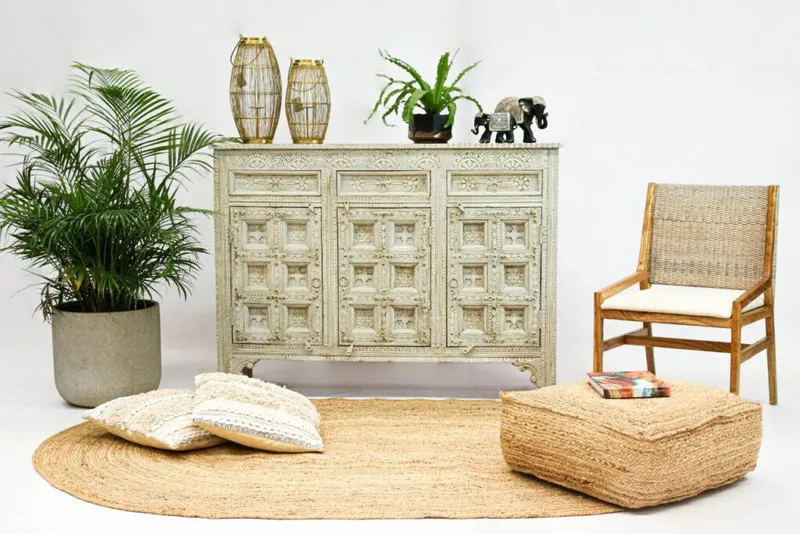After several failed ventures, here’s how this entrepreneur built an NSE-listed profitable company
Priti International was launched in 2005 by Hritesh Lohiya after his stock market business failed to grow. Today, Priti offers 250 SKUs in the home category such as tables, chairs, beds, lamps, and more.
Hritesh Lohiya’s journey is an inspiration for anyone struggling with finding a successful business venture.
In the early 2000s, Hritesh was failing at entrepreneurship. From chemical manufacturing to stone-cutting, he was unable to sustain any business for long. When his stock-broking business failed between 2004 and 2005, Hritesh felt that it was time to pause and reflect.
“I lost almost everything in that business,” he tells SMBStory.
Financially, it was a difficult period but he persevered. The year 2005 was when things began to change. Residing in Jodhpur which is a few hundred kilometers away from the India-Pakistan border, Hritesh says he encountered some people who accumulated military waste items like clothes and metal scraps.
A new beginning
He says he bought a few waste objects and started making home decor items such as cushions and bags in a chemical manufacturing factory. He marketed the products through emails to different buyers.
When asked about the initial investment, Hritesh says that he didn’t have any money so his buyers would finance him. They would give him the money to make the products, source the raw materials, etc.
The response was lukewarm in the beginning. From 2005 to 2007, they were mostly developing the products and had negligible sales. However, in 2009, when he visited Delhi to present these items at an exhibition, his products caught the attention of a buyer from Denmark who gave him a trial order worth $10,000.
This gave Hritesh, supported by his wife Priti Lohiya, the confidence to explore this business opportunity more seriously. This is how Jodhpur-based, Priti International, came into existence.
Over the next few years, the husband-wife duo kept marketing and selling these products. They gradually added a furniture category to the business after they were able to procure waste wood and iron directly from military suppliers. Continuously showcasing the items during exhibitions worked for the business. Hritesh says that apart from India, he would also set up stalls at events happening abroad such as in China and Germany.
And soon, a breakthrough arrived.
In 2011, the company was able to do a business of more than Rs 1 crore in an exhibition in China. From there, the orders from international buyers only increased.
Today, the Jodhpur-based company is not just profitable but is also listed on the National Stock Exchange.
There has been no looking back since then.
It currently offers 250 SKUs of which coffee tables, dining tables, and side tables are its highest revenue contributors (about 60 percent). Other categories that form a part of Priti’s business include tables, chairs, beds, wardrobes, lamps, etc.
The company has a workforce of 400 people, with Priti holding the position of a Managing Director and Hritesh as the chief financial officer (CFO).

Getting listed
While Priti’s founders diversified offerings early on, it was the furniture category that became a focal point for the company.
This category contributed about 70 percent to the overall revenues.
“We realised that we should focus on one category and then continue to grow in that.” He also said that handling so many SKUs was getting “too much to handle.”
“We felt it was more important for us to focus on one thing rather than many,” he says.
This also gave rise to the need of setting up Priti’s own manufacturing unit. Up until then, Priti was getting all the products contractually manufactured from units in and around Rajasthan.
Hritesh says that the business was clocking around Rs 20 crore around 2015 when the founders decided to focus on manufacturing furniture.
And this is when the question of raising funds arose. He also says that they did have conversations with some venture capitalists to fund the business but the investors were “not interested” in funding a business venture which was running offline and did not have an online presence.
In 2018, Priti International got listed on National Stock Exchange’s SME platform.
The company raised Rs 10 crore from its IPO in 2018 and brought machines from China, and Taiwan from the money it had raised.
The remaining capital was used to construct the factory. In all Rs 6 crore was utilised and the remaining was used for “corporate purposes.”
The Lohiya family, today, holds around 74.59 percent of the company. The rest is held by the public. The company migrated to the main NSE platform in March 2022.
Post IPO story
According to a report by Mordor Intelligence, the Indian furniture market is well-known both in the domestic as well as the global market owing to their unique furniture designs.
According to another report by ResearchandMarkets, India's furniture Market was $17.77 billion in 2020 and will rise to $37.72 billion by the end of the year 2026, growing at a double-digit CAGR (compound annual growth rate) of 13.37 percent during 2020-2026.
After running the company solely as an export business for many years, Hritesh sees immense potential in the Indian market today.
In fact, the COVID-19 pandemic pushed the company out of its comfort zone. Until 2020, Priti International was majorly an offline, exports business. Its focus never changed and it never explored the domestic market. “Our exports business was doing so well that we never felt the need,” he explains.
This changed when the pandemic disrupted everyday life in March 2020. Hritesh says that they launched their D2C website (PritiHome) and got listed on ecommerce platforms during the pandemic.
Priti now competes with startups like Pepperfry and Urban Ladder apart from bigger offline brands.
The company clocked Rs 38.8 crore revenue in FY21 and grew to Rs 60 crore in FY22. Hritesh says that while 90 percent of the revenues came from the export market (mainly Europe and the US), around Rs 10 crores have come from the online channels. Additionally, the company reported a profit after tax of Rs 3.09 crore and Rs 4.37 crore in FY21 and FY22 respectively.
“The online market has become very big and is going to become bigger in the future.” It also introduced a modular kitchen category which has been picking up steam.
Seventeen years later, it seems Hritesh is just getting started.
“Stock market is just beginning,” he says, adding that the larger plan is to expand more in India. The coming year will see the company setting up its brand stores in Jodhpur, Mumbai, Pune, and Bengaluru. It is also in the final stages of closing a deal with American apparel and home fashion brand, TJ-Maxx.
This deal is expected to increase revenues of the company by Rs 45 crore in this financial year, claims Hritesh.
Edited by Affirunisa Kankudti










